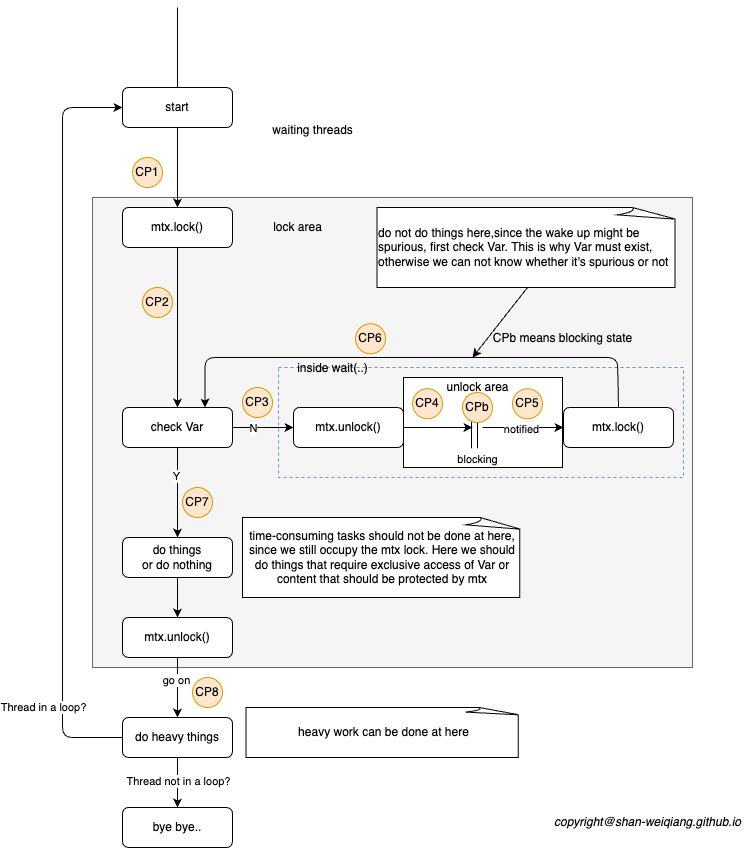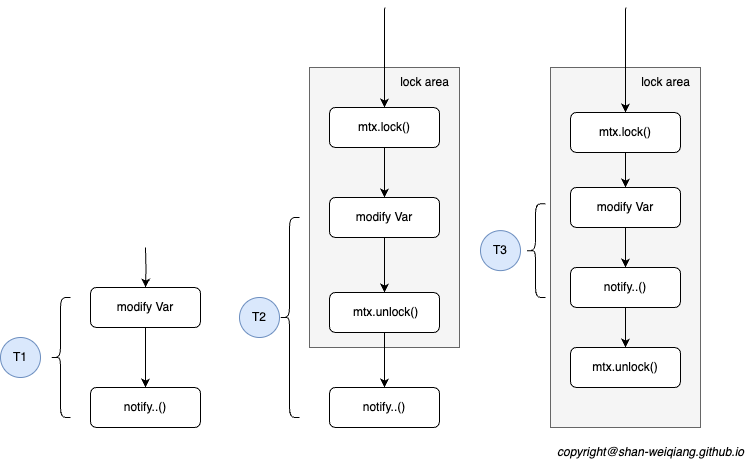std::condition_variable: a deeper look
This post tries to enumerate the pitfalls that might happen in the use of condition_variable. First I will explain scenarios in the use of condition_variable; then give a summary about tips of using it; At the end of the post, a live example is given to demonstrate what have been talked about in this post. Hope this will help someone to spent one less miniute debugging condition_variable.
Thread flow
To understand condition_variable, we assume following premises:
- There is only one notifying thread
- There is only one waiting thread
- The notify_one/notify_all will only be called once
- The condition is atomic bool
You might think these premises are too much and what’s the point of analysing it with so many premises. As it turns out, even with these premises, the situation is so complicated that it deserves efforts to understand it. Besides, after we are clear about this, we can understand all situations that are not bounded by those premises.
Waiting thread
condition_variable is implemented on futex in Linux, I will not go deeper about it at here, it’s too big a topic, more info can be found here. All we need to know in this blog is following:
- Iniside the
waitfunction call, the mutex associated with it will be unlocked before blocking - The unlock of the mutex and the changing to block state is done atomically
- After wake up of the blocking thread, the thread will first tries to lock the associated mutex, before return
Following is the diagram showing the state of the waiting thread:

In this diagram:
Varis the atomic conditionmtxis the mutex- The grey area is area that are protected by the
mtx - The
CP1toCP8are checkpoints to indicate where the waiting thread might possibly be when the notifying thread callsnotify_one/notify_all - The
CPbmeans block state, it is done atomically withCP4, here I draw it specifically to demonstrate this point - The dashed rectangular is to indicate the
wait(..)function call. Note that inside this function call, there is unlock and lock of themtx - Also I draw a loop, which is a typical use of the waiting thread, which might be is inside a infinite
whileloop
Notifying thread
The notifying thread is the thread that changes the condition and calls notify_one/notify_all. We consider all the three possible way of calling these methods:
- Without holding the
mtxat all - Holding the lock while changing the condition only
- Holding the lock while changing the condition and calling
notify_one/notify_all
Following diagrams show the different ways of calling notify_one/notify_all:

Note the T1 to T3 in the diagram, which indicate the time between the changing of the condition and the calling of the notify_one/notify_all. As you will see ,what happens inside these time intervals are of crucial importance in deciding the final behavior.
The matrix
Image that there is one notifying thread and one waiting thread like in our premises. When the notifying thread calls notify_one/notify_all, what is supposed to happen in our three ways of notifying? Will the waiting thread behaves as expected after the calling of notify_one/notify_all?
It turns out that these are really complex questions and it needs a matrix to express all the possibilities:

Just like said earlier, what happens between modifying of the condition and calling of notify_one/notify_all is crucial to understand this table. Let’s explain all the possibilities one by one.
T1 scenario
In this scenario, the notifying thread and waiting thread are not influenced by each other through the mtx(even though the condition itself is atomic, it does not change the result here). When the notifying thread calls notify_one/notify_all, the waiting thread might be in:
CP1: This is OK, since the condition has been changed by notifying threadCP2: This is OK, same asCP1CP3: This need a litte more words. Here means the check of condition fails, which indicate that the waiting thread checked the condition before changing of the condition by the notifying thread. The waiting thread will go to blocking state and miss the notification by the waiting thread. As the promise says that our notifying thread will notify only once, this means that the waiting thread will wait forever!CP4,CPb: Behave as expected, since waiting thread already in blocking state and the notification will work as usual.CP4andCPbare completed atomically! They can be seen as same state, I intentionally split into two checkpoints to demonstrate this point.CP5,CP6: Not possible, since the premise says that there is only one notification call.CP7~CP8: This is OK, the waiting thread check the condition after it has been changed by notifying thread.
T2 scenario
The notifying thread hold the mutex when changing the condition, which means:
- During the time interval
T2, waiting thread must start at unlock state of themtx, namely,CP1andCP8:
Let’s discuss all the checkpoints case by case:
CP1: This is OKCP2: This is OK, waiting thread get the lock after notifying thread releasing the lockCP3: This is NOT possible! This is the trickist part of all situations. Let me explain it step by step:- If at the time of the notifying thread calling
notify, the waiting thread is atCP3, the waiting thread might hold themtxbefore or after the notifying thread’s holding of the lock when changing the condition- Before case: it should have go on to
CP4, so it’s a contradiction - After case: it is not possible since the condition had already been changed when waiting thread get the
mtx, it should have go toCP7, instead ofCP3!!
- Before case: it should have go on to
- If at the time of the notifying thread calling
CP4,CPb: This is OK. This happens if waiting thread check the condition before it being changed. It works as usual, the waiting thread will be woken up.CP5,CP6: Not possible, since the premise says that there is only one notification call.CP7~CP8: This is OK, the waiting thread check the condition after it has been changed by notifying thread.
T3 scenario
The waiting thread changes the condition and call notify_one/notify_all while holding the mtx.
CP1: This is OKCP2: Not possible, since when callingnotify_one/notify_all, notifying thread is holding themtxCP3: Same asCP2CP4,CPb: This is OK. This happens when the waiting thread is firstly get themtxand go to blocking state; then the notifying thread get themtx. In this situation, the waiting thread will be woken from the kernel, but immedidately be blocked since the notifying thread is holding the lock. Only after the notifying thread release the lock, the waiting thread will be woken again to get the same lock.CP5: Not possible, since the premise says that there is only one notification call.CP6: Not possible, same reason asCP5. Even without the same reason forCP5,CP6is also impossible, since notifying thread is holding the same lock.CP7: Not possible, since notifying thread is holding the same lockCP8: Not possible, since the premise says that there is only one notification call. There is no way the waiting thread has already passed the condition by now
Golden rules
- Always use
condition_variablewith a condition, otherwise there is no way to check whether it’s a spurious wake up or not - Use the same lock to protect:
- Anything that might change the condition, even when the condition itself is atomic. As the analysis above, the atomic nature of the condition does not change the analysing results.
- Anytime checking the condition
- The futex(realized by passing it to
wait(..))
Real world example
Following is an implementation of thread pool, it basically shows every respect of the usage of condition_variable:
#include <cstddef>
#include <iostream>
#include <condition_variable>
#include <mutex>
#include <queue>
#include <functional>
#include <thread>
#include <vector>
/// In this example the expression: stop || !tasks.empty() is the 'condition' between notifying
/// thread and waiting thread. The condition is used to avoid spurious wakeups. Every time the notifying
/// thread wants to do something that modifies the result of the condition, the mutex must be aquired.
/// The notify_one/notify_all can be called during the hold of the mutex, or can be called after the
/// release of the mutex, the difference is that if called during the hold of the lock, the waiting thread
/// will immediately blocked to wait for the release of the mutex by the calling thread here.
class ThreadPool {
public:
ThreadPool(std::size_t thread_num) : stop(false) {
for (int i = 0; i < thread_num; i++) {
threads.emplace_back(std::thread(&ThreadPool::thread_func, this));
}
}
~ThreadPool() {
// aquire lock before changing the condition
{
std::unique_lock<std::mutex> lock(m);
stop = true;
}
cv.notify_all();
for (auto &thread : threads) {
thread.join();
}
}
template <typename F>
void submit_task(F &&func) {
// aquire lock before changing the condition
{
std::unique_lock<std::mutex> lock(m);
tasks.emplace(std::forward<F>(func));
}
// call notify_all after release the lock; this will prevent the waiting thread from immediate block
// after wake up
cv.notify_one();
}
private:
void thread_func() {
while (true) {
std::function<void()> task;
{
std::unique_lock<std::mutex> lock(m);
// wait for the condition to be true; condition is required. If no condtion, waiting thread
// can not decide it's spurious wake-up or not
cv.wait(lock, [this]() { return stop || !tasks.empty(); });
if (stop && tasks.empty()) {
return;
}
// protected under the mutex, since these steps will change the condition
task = std::move(tasks.front());
tasks.pop();
}
// do not influence the condition, do it without holding the mutext
task();
}
}
std::queue<std::function<void()>> tasks;
// This mutex is used for three purpose and these three purposes must be protected under this same mutex:
// 1. Protect the tasks queue
// 2. Protect the stop condition
// 3. Protect the condition variable(which is a futex)
// 1 and 2 both influence the result of the condition; 3 is required by the futex implementation in syscall
std::mutex m;
std::condition_variable cv;
bool stop;
std::vector<std::thread> threads;
};
int main() {
// used to sync std::cout
std::mutex m;
ThreadPool pool(4);
for (int i = 0; i < 8; i++) {
pool.submit_task([i, &m]() {
std::lock_guard<std::mutex> lock{m};
std::cout << "Task " << i << " is running\n";
});
}
std::this_thread::sleep_for(std::chrono::seconds(5));
pool.submit_task([&m]() {
std::lock_guard<std::mutex> lock{m};
std::cout << "This is the last task" << std::endl;
});
return 0;
}